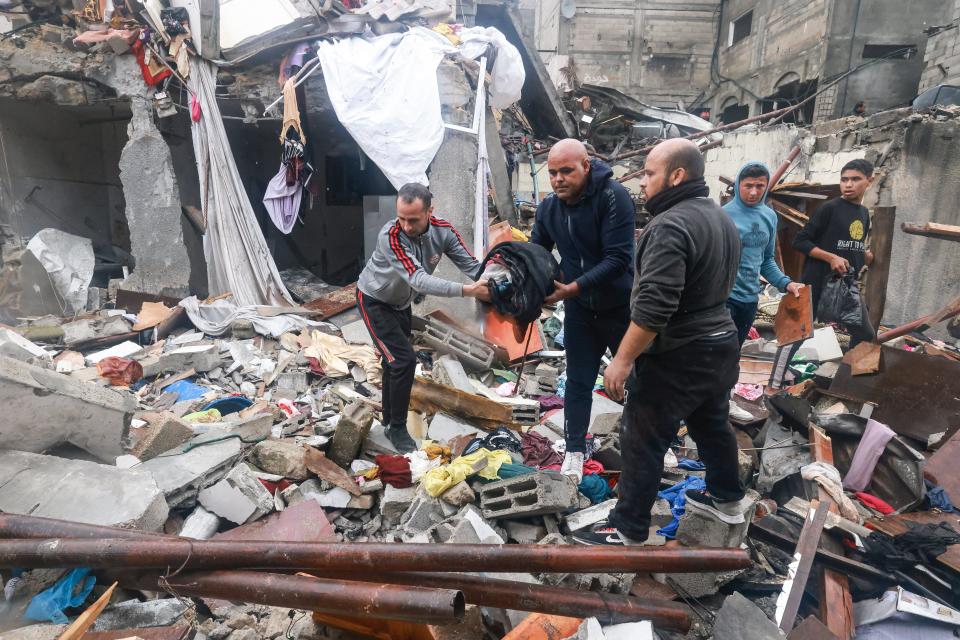I'm a Holocaust scholar. We need to talk about what's happening in Gaza.
Genocide is a strong word. For groups that have experienced it, the term evokes a primal fear — not only of attempts to exterminate, but also of the world's indifference. It has geopolitical implications. In 1994, President Bill Clinton avoided using the word in reference to atrocities in Rwanda because doing so might establish an obligation to take action. And it is the ultimate charge: an accusation of the most depraved and inhumane behavior.
For this reason, genocide scholars are cautious about using the term loosely, especially regarding unfolding events where passions run high. There’s a big difference between lobbing a rhetorical bomb and doing the careful work of scholarly analysis.
And so we should pay attention when genocide scholars — including Holocaust scholars — speak about the possibility of genocide in the Gaza strip. It means that the violence has become so alarming that silence feels intolerable. We are reminded of silences as other genocides unfolded — including genocides that devastated our own communities.
In recent weeks, Holocaust historians Omer Bartov and Raz Segal, both Israelis, have raised the specter of genocide in Gaza. Segal has described the current situation as “a textbook case of genocide.” Bartov, one of the world’s leading Holocaust scholars, describes a possible “ethnic cleansing operation that could quickly devolve into genocide” — and urges us to raise our voices before Israel’s actions fit this terrible descriptor.
As of this writing, at least 18,000 Gazans have been killed (not including those buried in the rubble) and over 50,000 injured. There is little food, potable water, or electricity; the health care system is in a state of collapse as infectious diseases attack weakened bodies living in unsanitary conditions. Nearly the entire population of over 2 million is displaced, with at least 60% of Gaza’s housing destroyed or damaged as of Nov. 24. There is no means of escape.

Does it matter what words we use to describe the current situation in Gaza? In a legal sense, it does. International law has specific criteria for genocide, crimes against humanity, war crimes, apartheid, and other charges that legal scholars and human rights organizations (including Israel’s leading human rights organization) have used to describe Israel’s treatment of Palestinians. If there are future legal proceedings, the terminology — together with evidence backing each particular charge — will be crucial.
Most of us, though, are not international lawyers. We use terms like genocide and ethnic cleansing in different but equally important ways. Historians, for example, look at atrocities that occurred before the establishment of these legal frameworks to ask questions like whether the aim was complete eradication of a particular group (genocide) or the eradication of a group from a particular territory (ethnic cleansing — a term that even now does not appear in international law). Ordinary people who simply want to maintain a basic level of decency use terms like “crimes against humanity” to describe actions that are so vile that they are unacceptable under any circumstances.
These powerful terms emerge in discussion of Hamas as well as the Israeli state. Was Hamas’ attack of Oct. 7 a crime against humanity? And what should we make of Hamas’ past statements calling for the eradication of the Israeli state? Does that imply genocide?
These are serious questions. Hamas, too, is bound by international law, and we must apply ethical standards to all entities that take consequential actions. But Hamas’ acts do not diminish Israel’s responsibility for its behavior, in either a legal or a moral sense.
Criminal and extreme as it was, the attack of Oct. 7 was a singular event, though with ongoing consequences: hostages remain in captivity and Israel has thousands of internally displaced persons. But what has ensued has been a one-sided action, with Israel bombarding, invading, and laying siege to over 2 million people — about half under the age of 18 — with no escape route and no means of self-defense.
Claims of a genocidal threat on Hamas’ part confuse capacity with intent. Hamas has made genocidal statements and proven willing to inflict massive violence on civilians; it continues to fire missiles into Israel (usually intercepted by the Iron Dome). Yet it is not equipped to carry out a genocide against wealthy, heavily armed, internationally protected Israel. Powerful groups commit genocide — or ethnic cleansing — against weaker groups, not the other way around.
We must look honestly at this reality. Every day brings more death, destruction, and disease to a trapped and starving civilian population. Whatever terminology we choose, the time to end a humanitarian catastrophe is now; the time to prevent genocide is before it happens. We must start by acknowledging some fundamental truths — and by insisting that our representatives in the United Nations, Congress, and the White House act accordingly. The alternative is to wait for the incontrovertible proof that comes only after the dust has settled — and then to wring our hands about carnage that unfolded before our eyes in real time.
Elizabeth Heineman is a Holocaust scholar and educator at the University of Iowa. Contact: elizabeth-heineman@uiowa.edu.
This article originally appeared on Des Moines Register: Israel and Gaza: 'Genocide' is a loaded term but we must talk about it

